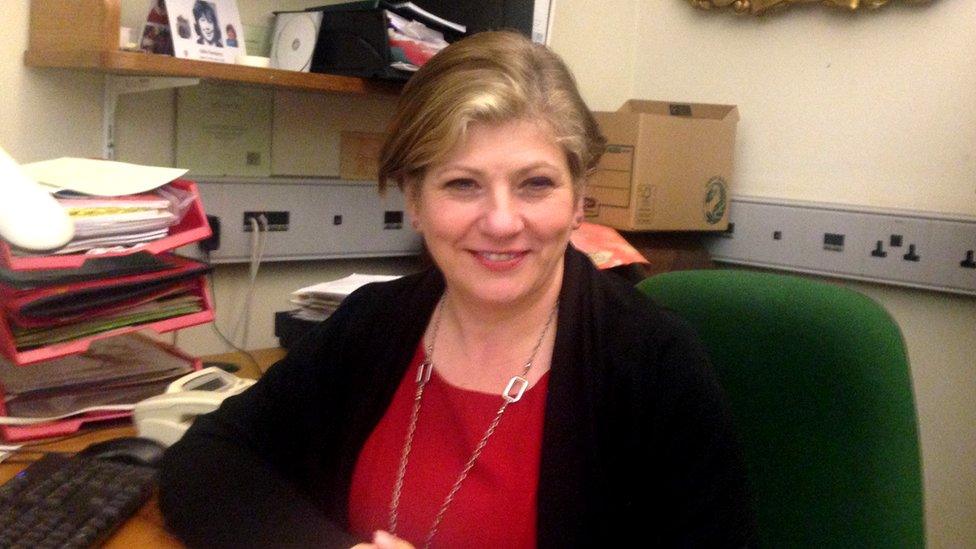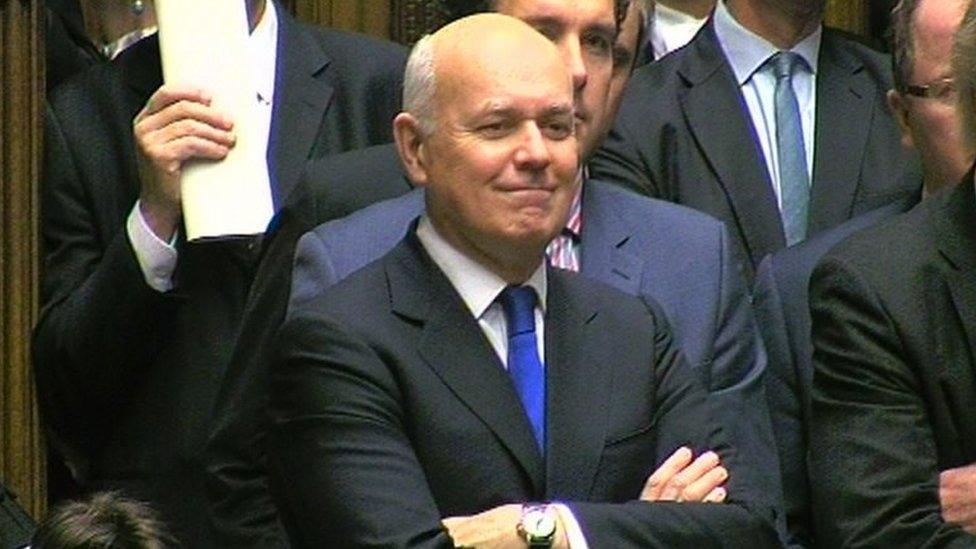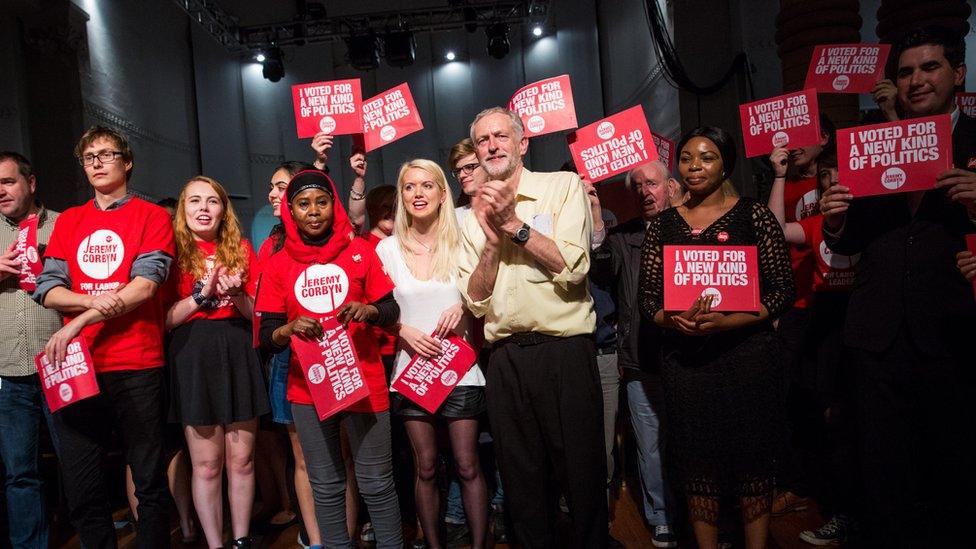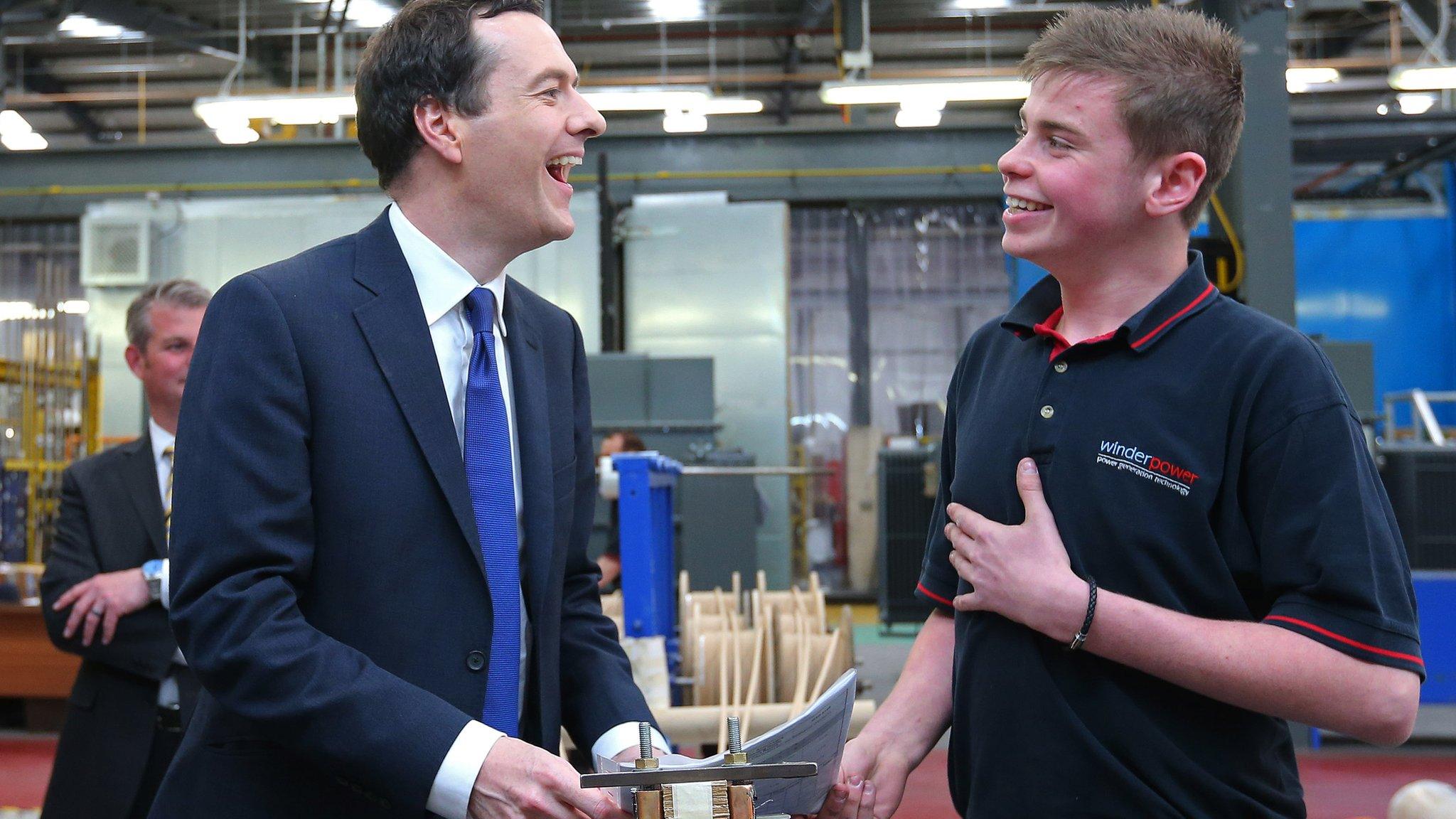Emily Thornberry: 'There is no jobs miracle'
- Published

If there is one subject Labour should have plenty to say about it is jobs, so why does the government so often seem to dominate the debate?
That is one of the issues vexing Emily Thornberry, as she gets to grips with her role as the party's shadow work and pensions minister.
"The problem is that the Tories have got so good at rhetoric and so good at keeping the line," she says.
"They just stick to the line, which can completely distort the truth, but because they are so good at message discipline they have got a march on us."
Thornberry has, famously, had her own issues with message discipline. She was branded a "snob" and forced to quit the shadow cabinet after she tweeted a picture of a house with three England flags and a white van parked outside.
"I apologised if I caused any real offence to anyone and I resigned and I have moved on. There is not much else I can say, I think," she says, when we meet in her large, but still cosily cluttered, Parliamentary office.
'Strivers and skivers'
The Islington South MP was given a second chance by Jeremy Corbyn, who represents a neighbouring seat in North London, although she has not quite made it back to the top table.
Owen Smith is the shadow work and pensions secretary, doing battle, sometimes explosively, with Iain Duncan Smith across the Commons despatch box over Universal Credit and other issues.
Thornberry has, meanwhile, been toiling away on committees, trying to lay a glove on well-drilled junior DWP ministers, and thinking about how to seize back the initiative from the government on what should be a vital policy area for Labour.
David Cameron and George Osborne have sought to steal Labour's clothes by portraying the Conservatives as the true workers' party, on the side of taxpayers rather than those who choose a life on benefits, with what is sometimes characterised as a "strivers versus skivers" strategy.
As a striver herself - she failed her 11-plus and had to do courses to get enough A-Levels to study law at university - can Thornberry see why this Conservative message seemed to resonate with many voters in May?
"Everybody knows a family like that. I am not pretending they don't exist. But I don't believe they are the majority. I believe that for every job, there are two people looking for a job".
'No jobs miracle'
And even those that do have a job often struggle to put food on the table, with low pay, soaring rents and zero hour contracts, she argues.
"We need to start talking about reality, about real life. There is no jobs miracle," says Thornberry.

Iain Duncan Smith and his ministers are well-drilled opponents
It's a tough message to get across - employment figures provide neater headlines than tales of woe about poor terms and conditions - but it is getting easier, thanks in no small part to George Osborne, she argues.
The chancellor's tax credit U-turn has introduced millions of voters to the concept of "in-work" benefits.
"Tax credits helped get across the idea that people with jobs are also claiming benefits," she explains.
New Labour did not want to appear "soft" on welfare so it tended to keep quiet about extra benefit money for the low paid (the name didn't help - tax credits have nothing to do with tax).
"Gordon did it so discretely," says Thornberry, but, thanks to all the publicity about tax credits, "I can now have conversations with people, who might know people in their family or their community who are working but are on benefits too. For too long people had just bought into the Tory rhetoric about shirkers and strivers."
Thornberry's other bete noir is the raw deal she believes young people are getting, painting a bleak picture of dead-end jobs, high rents, benefit cuts and student debt, while the older generation hoards all the wealth.

Jeremy Corbyn has attracted young people into politics - but not enough, says Emily Thornberry
She admits to regularly haranguing youngsters about the need to vote to get their voices heard: "They have to start demanding rights for their generation, which they are not getting."
"We need to be talking on behalf of the whole country but I think there is a crying need for the younger generation to be represented politically and to be engaged."
What about all the young people Jeremy Corbyn has brought into the Labour Party?
It has been "amazing", she says, but there is still a long way to go and "young people have to meet us half way".
'Stop triangulating'
Thornberry argues passionately for improving the quality of training schemes - claiming that the government's much trumpeted target of three million apprenticeships by 2020 is essentially a PR exercise, with poorly paid menial jobs rebranded as apprenticeships to tick a box.
Far better, she says, to have fewer, higher quality training schemes, that actually train youngsters in a meaningful trade.
But don't expect to see any detailed policies from Labour in the near future.
"We have to be realistic about where we are in the electoral cycle," she says. She sees her job, at this early stage, as holding the government to account and, despite her earlier plea for message discipline, appears to be relishing the greater freedom she says the Corbyn era has given Labour MPs to speak their mind.
"One of the good things about Jeremy becoming leader is that it has kind of opened us up to think in a different way," she says,
"I think the reason a lot of people joined the Labour Party and have enthusiasm for the Labour Party was this possibility of being able to stop triangulating and to say what we mean and mean what we say," she says.
- Published25 November 2015

- Published21 November 2014
